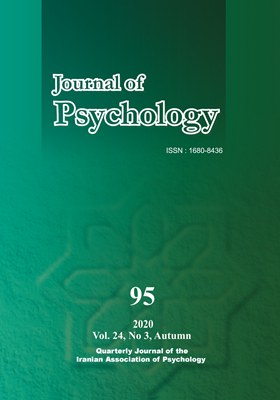The Role of Pathological Traits, Early Maladaptive Schemas and Emotional in Predicting Personality Disorders of Cluster “C”
Subject Areas : PsychologyAlireza Gol 1 , Behnaz Shid Anbarani 2 , Hamidreza Aghamohammadian Sharbaf 3 , Sajjad Namvar Tabatabaee 4 , Mohammad Khakshour Kameh Olya 5
1 - Department of Psychology, Ferdowsi University of Mashhad, Mashhad, I. R. Iran
2 - Department of Psychology, Ferdowsi University of Mashhad, Mashhad, I. R. Iran
3 - Department of Psychology, Ferdowsi University of Mashhad, Mashhad, I. R. Iran
4 - Department of Psychology, Ferdowsi University of Mashhad, Mashhad, I. R. Iran
5 - Department of Psychology, Ferdowsi University of Mashhad, Mashhad, I. R. Iran
Keywords: personality disorders, pathological personality traits, early maladaptive and emotional schemas,
Abstract :
The purpose of this study was to investigate the role of pathological (morbid) personality traits, early maladaptive and emotional schemas in predicting C-Cluster personality disorders. This is a descriptive correlational study. The sample is 359 (230 females and 129 males) who were selected from the age range of 18-50 years in Mashhad. The research instruments were Personality Disorder Questionnaire (PDQ-4), DSM-5 Personality Inventory (PID-5), Early Maladaptive Schemas Questionnaire (YSQ) and Leahy Emotional Schema Scale (LESS). Descriptive statistics, Pearson correlation and stepwise multiple regression analysis were used for data analysis. The findings of this study showed that the variables of control, impaired autonomy, disinhibition, rumination, negative affectivity, consensus, and rationality are significantly capable of predicting dependent personality disorder and the variables of control, disconnection and rejection, guilt and shame, expression, negative affectivity, higher values, and duration had significant predictive power of avoidant personality disorder. variables of negative affectivity, simplistic view of emotion, psychoticism, higher values, disinhibition, and guilt and shame significantly predict the obsessive-compulsive personality disorder. It can be concluded that morbid personality traits, early maladaptive, and emotional schemas play a significant role in predicting personality disorders of cluster “C”.
آهي، قاسم (1384). هنجاريابي فرم کوتاه پرسشنامه روان بنه يانگ (SQ-SS) (بررسي ساختار عاملي) بين دانشجويان دانشگاههاي تهران در سال تحصيلي 83-84، پايان نامه کارشناسي ارشد، دانشکده روان شناسي و علوم تربيتي، دانشگاه علامه طباطبائي.
صدوقي، زهره.، آگيلار- وفايي، مريم.، رسولزاده طباطبايي، کاظم، و اصفهانيان ناميه. (1387). تحليل عاملي نسخه کوتاه پرسشنامه روان بنه يانگ در نمونه غيرباليني ايراني. مجله روانپزشكي و روانشناسي باليني ايران، 14 (2)، 219-214.
Ashton, M. C., Lee, K., de Vries, R. E., Hendrickse, J., & Born, M. P. (2012). The maladaptive Personality Traits of the Personality Inventory for DSM-5 (PID-5) in relation to the HEXACO personality factors and schizotypy/dissociation. Journal of Personality Disorders, 26(5), 641-659.
Association, Psychiatnic Association. (2013). Diagnostic and statistical manual of mental disorders (DSM-5®): American Psychiatric Pub.
Bach, B., Lockwood, G., & Young, J. E. (2018). A new look at the schema therapy model: Organization and role of early maladaptive schemas. Cognitive Behavior Therapy, 47(4), 328-349.
Beeney, J. E., Lazarus, S. A., Hallquist, M. N., Stepp, S. D., Wright, A. G., Scott, L. N., & Pilkonis, P. A. (2019). Detecting the presence of a personality disorder using interpersonal and self-dysfunction. Journal of Personality Disorders, 33(2), 229-248.
Carr, S. N., & Francis, A. J. (2010a). Early maladaptive schemas and personality disorder symptoms: An examination in a non‐clinical sample. Psychology and Psychotherapy: Theory, Research and Practice, 83(4), 333-349. (1)
Carr, S. N., & Francis, A. J. (2010b). Do early maladaptive schemas mediate the relationship between childhood experiences and avoidant personality disorder features? A preliminary investigation in a non-clinical sample. Cognitive Therapy and Research, 34(4), 343-358. (2)
Cloninger, C. R. (1999). Personality and psychopathology: American Psychiatric Pub.
Cuijpers, P., Smit, F., Penninx, B. W., de Graaf, R., Ten Have, M., & Beekman, A. T. (2010). Economic costs of neuroticism: A population-based study. Archives of General Psychiatry, 67(10), 1086-1093.
Diedrich, A., & Voderholzer, U. (2015). Obsessive-compulsive personality disorder: A current review. Current Psychiatry Reports, 17(2), 2.
Hopwood, C. J., Thomas, K. M., Markon, K. E., Wright, A. G., & Krueger, R. F. (2012). DSM-5 personality traits and DSM-IV personality disorders. Journal of Abnormal Psychology, 121(2), 424.
Joseph, S. (2019). Personality disorders: New symptom-focused drug therapy: Routledge.
Leahy, R. L. (2018). Emotional schema therapy: Distinctive features: Routledge.
Leahy, R. L. (2002). A model of emotional schemas. Cognitive and Behavioral Practice, 9(3), 177-190.
Liggett, J., Sellbom, M., & Carmichael, K. L. (2017). Examining the DSM-5 Section III criteria for obsessive-compulsive personality disorder in a community sample. Journal of Personality Disorders, 31(6), 790-809.
Livesley, W. J., & Larstone, R. (2018). Handbook of personality disorders: Theory, research, and treatment: Guilford Publications.
Miller, J. D., Few, L. R., Lynam, D. R., & MacKillop, J. (2015). Pathological personality traits can capture DSM–IV personality disorder types. Personality Disorders: Theory, Research, and Treatment, 6(1), 32.
Nordahl, H. M., Holthe, H., & Haugum, J. A. (2005). Early maladaptive schemas in patients with or without personality disorders: Does schema modification predict symptomatic relief? Clinical Psychology & Psychotherapy, 12(2), 142-149.
Oldham, J. M. (2018). DSM models of personality disorders. Current Opinion in Psychology, 21, 86-88.
Riddle, M. A., Maher, B. S., Wang, Y., Grados, M., Bienvenu, O. J., Goes, F. S., & Greenberg, B. D. (2016). Obsessive–compulsive personality disorder: Evidence for two dimensions. Depression and Anxiety, 33(2), 128-135.
Schmidt, N. B., Joiner, T. E., Young, J. E., & Telch, M. J. (1995). The Schema Questionnaire: Investigation of psychometric properties and the hierarchical structure of a measure of maladaptive schemas. Cognitive Therapy and Research, 19(3), 295-321.
Weinbrecht, A., Schulze, L., Boettcher, J., & Renneberg, B. (2016). Avoidant personality disorder: A current review. Current Psychiatry Reports, 18(3), 29.
Widiger, T. A. (2011). Personality and psychopathology. World Psychiatry, 10(2), 103.
Yavuz, K. F., Turkcapar, M., Demirel, B., & Karadere, E. (2011). Adaptation, validity and reliability of the Leahy Emotional Schema Scale Turkish version based on Turkish university students and workers. J Psychiatry Neurological Sci, 24(4), 273-282.


